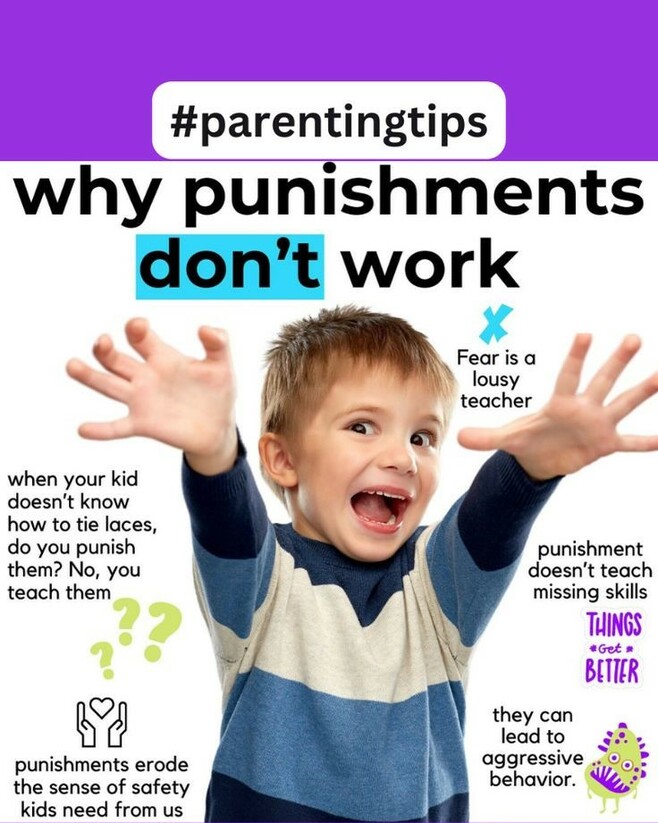20 Positive Alternatives to Punishment: Build Connection, Not Conflict

Download 20 alternatives to punishment printable guide here
How do you react when your child refuses to brush their teeth or crashes the family car? Jumping to punishments like yelling, grounding, or taking away privileges is tempting. But here's the thing: punishment often damages your relationship and lowers your child's self-esteem.
What if there was a better way? — one that teaches responsibility and emotional skills while preserving your bond with your child? Let's explore effective, positive alternatives to punishment.
How Do You Handle Challenges as a Parent?
Every parent reacts differently to challenging moments. Which approach sounds most like you?
- The Enforcer: "Rules are rules! If my child doesn't listen, there are consequences, end of story."
- The Pleaser: "I just want to avoid conflict, so I end up giving in to whatever my child wants."
- The Connector: "I try to understand my child's perspective while teaching them to do better."
No matter your parenting style, these strategies can help you guide your child positively and productively.
Why Does This Matter?
Punishments might stop the behaviour temporarily, but they don't teach your child the skills to manage their emotions or make better decisions. Instead, they create resentment and fear. Positive alternatives, on the other hand, can help your child:
- Develop self-control and problem-solving skills.
- Feel safe and connected to you, which makes them more likely to cooperate.
- Build self-esteem instead of feeling shame.
As parenting expert Dr. Laura Markham says, "Punishment erodes connection, which is the only reason kids cooperate. Instead, focus on guiding your child with love".
Download 20 alternatives to punishment printable guide here
What You Can Do
Here are five proven strategies to replace punishment with connection and learning:
-
Prepare in Advance
Set your child up for success by thinking ahead.
- Example: If you're heading to the doctor's office, explain what behaviour you expect and bring a favourite book or toy to keep them occupied.
-
Offer Choices Instead of Commands
Empower your child by giving them choices.
- Instead of: Brush your teeth now! or Clean your room now!
- Try: "Would you like to brush your teeth before or after putting on your pyjamas?" or "Would you like to clean your room before or after dinner?"
This reduces power struggles and encourages cooperation.
-
Use Humor to Defuse Tension
Laughter can transform conflict into connection.
- Example: If your child is upset about brushing their teeth, make it fun by pretending the toothbrush is a superhero battling cavity villains.
- Expert Tip: Dr. Lawrence Cohen, author of Playful Parenting, says, "Humor helps children release big emotions without fear of judgment."

4. Involve Your Child in Problem-Solving
Collaborate with your child to find solutions. Studies show that involving kids in problem-solving builds critical thinking and accountability.
- Example: If your teen crashes the car, ask, "What steps can we take to ensure this doesn't happen again?"
Find more tips in this article: How to Teach Problem-solving Skills to Your Child: A Guide for Every Age.
5. Let Natural Occurrences occur (when appropriate)
Don't rescue too much. Children learn best through experience. When they encounter the natural outcomes of their actions, as long they don't put your child in danger and they are age-appropriate. They're more likely to recall lessons about responsibility and consequences.
Example: A child who does not hang up their bathing suit and towel may find them still wet the next day. (But don't create artificial consequences.)
Find more tips in this article: Should you let your child face consequences?
Reflect on Your Approach
Take a moment to think about your parenting style:
- Do you tend to use punishments?
- How might these strategies fit into your daily routines?
- What's one small change you could try today?
Ready to Build a Stronger Connection?
Positive parenting is a journey. It doesn't mean being perfect. Choose one or two strategies and start small. What approach will you try first? We have covered five strategies in detail, but there are many more. In our parenting classes, you will learn parenting ideas that allow your relationship with your child to grow and develop healthily and how to communicate appropriately to your child's age. You can register for these classes on our website.
Download 20 alternatives to punishment printable guide here
While implementing positive strategies can transform your relationship with your child, there are moments when emotions like anger can feel overwhelming — for both parents and children. In our next blog post, we'll explore practical ways to manage anger and recognize when it might be time to reach out for support. We'll share helpful tips, personal stories, and expert advice to help you and your family thrive. Subscribe to our newsletter below to stay connected.
Want the complete list of 20 strategies?
